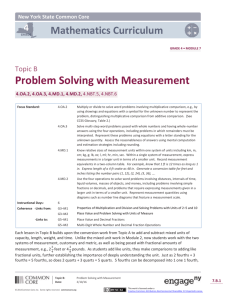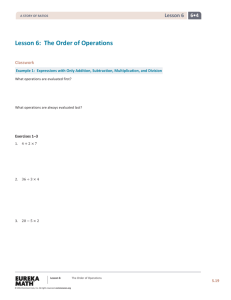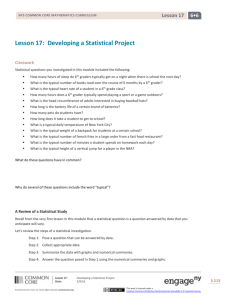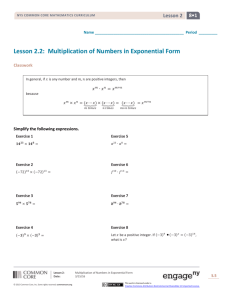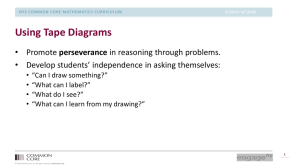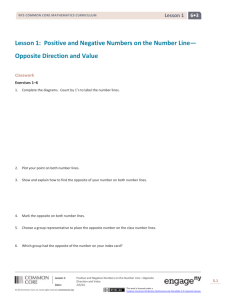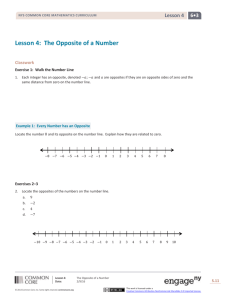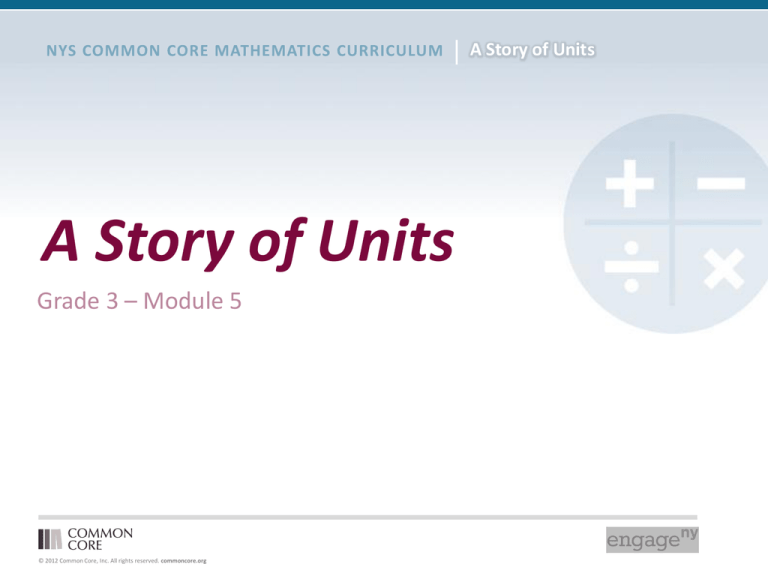
A Story of Units
A Story of Units
Grade 3 – Module 5
© 2012 Common Core, Inc. All rights reserved. commoncore.org
A Story of Units
Session Objective
Prepare to implement Module 5 by examining
mathematical models and instructional strategies in the
lessons.
© 2012 Common Core, Inc. All rights reserved. commoncore.org
A Story of Units
Curriculum Overview of A Story of Units
© 2012 Common Core, Inc. All rights reserved. commoncore.org
A Story of Units
Module Overview
• Read the descriptive
narrative
•
•
Underline key phrases
Circle models that are
used in the module
© 2012 Common Core, Inc. All rights reserved. commoncore.org
A Story of Units
Progressions and Module 5 Topics
© 2012 Common Core, Inc. All rights reserved. commoncore.org
A Story of Units
End-of-Module Assessment
What concepts will students need to master by the
end of the module?
© 2012 Common Core, Inc. All rights reserved. commoncore.org
A Story of Units
Grade 2-Module 8 -Topic C
© 2012 Common Core, Inc. All rights reserved. commoncore.org
A Story of Units
Topic A:
Partition a Whole into Equal Parts
Grade 3 NF Progressions, Pg. 2
© 2012 Common Core, Inc. All rights reserved. commoncore.org
A Story of Units
Lesson 1 Concept Development
© 2012 Common Core, Inc. All rights reserved. commoncore.org
A Story of Units
Lesson 1 Concept Development
© 2012 Common Core, Inc. All rights reserved. commoncore.org
A Story of Units
Lesson 1 Exit Ticket
Lesson 1 Exit Ticket
© 2012 Common Core, Inc. All rights reserved. commoncore.org
A Story of Units
1. There are ____________ equal parts in all.
2. One equal part is called ______________.
Lesson 2 Concept Development
© 2012 Common Core, Inc. All rights reserved. commoncore.org
A Story of Units
1. There are ____________ equal parts in all.
2. One equal part is called ______________.
Fold and label strips showing:
Halves
fourths
eighths
thirds
sixths
fifths*
fenths*
© 2012 Common Core, Inc. All rights reserved. commoncore.org
A Story of Units
Lesson 3 Concept Development
© 2012 Common Core, Inc. All rights reserved. commoncore.org
A Story of Units
Lesson 3 Problem Set
© 2012 Common Core, Inc. All rights reserved. commoncore.org
A Story of Units
Lesson 4: Represent and identify fractional
parts of different wholes.
Let’s explore!
Lesson 4 Concept Development
© 2012 Common Core, Inc. All rights reserved. commoncore.org
A Story of Units
Lesson 4 Problem Set
© 2012 Common Core, Inc. All rights reserved. commoncore.org
A Story of Units
Turn and Talk:
• Explain what is meant by “equal parts” from the
learning that occurs in Topic A.
• Why is it important to use a variety of concrete and
pictorial models to develop this foundational idea of
“equal parts?”
© 2012 Common Core, Inc. All rights reserved. commoncore.org
A Story of Units
Topic B:
Unit Fractions and their Relation
to the Whole
Grade 3 NF Progressions, Pg. 3
© 2012 Common Core, Inc. All rights reserved. commoncore.org
A Story of Units
Lesson 5 Concept Development
© 2012 Common Core, Inc. All rights reserved. commoncore.org
A Story of Units
Lesson 5 Problem Set, Page 1
© 2012 Common Core, Inc. All rights reserved. commoncore.org
A Story of Units
Lesson 6 Concept Development
© 2012 Common Core, Inc. All rights reserved. commoncore.org
A Story of Units
Lesson 6 Problem Set
© 2012 Common Core, Inc. All rights reserved. commoncore.org
A Story of Units
Lesson 7 Concept Development
© 2012 Common Core, Inc. All rights reserved. commoncore.org
A Story of Units
Problem 1
Problem 2
Lesson 8
© 2012 Common Core, Inc. All rights reserved. commoncore.org
A Story of Units
Problem 3
Lesson 8-9 Concept Development
© 2012 Common Core, Inc. All rights reserved. commoncore.org
A Story of Units
Try the Lesson 8 Problem Set
Lesson 8 Problem Set
© 2012 Common Core, Inc. All rights reserved. commoncore.org
A Story of Units
Turn and Talk:
How does using the number bond help model unit
fractions as the basic building blocks of fractions in
Topic B?
© 2012 Common Core, Inc. All rights reserved. commoncore.org
A Story of Units
Topic C: Comparing Unit Fractions and
Specifying the Whole
Grade 3 NF Progressions, Pg. 2
© 2012 Common Core, Inc. All rights reserved. commoncore.org
A Story of Units
Lesson 10 Problem Set
© 2012 Common Core, Inc. All rights reserved. commoncore.org
A Story of Units
1 is the same as 1
Lesson 11 Concept Development
© 2012 Common Core, Inc. All rights reserved. commoncore.org
A Story of Units
is less than
1
is less than
6
Lesson 11 Concept Development
© 2012 Common Core, Inc. All rights reserved. commoncore.org
1
3
A Story of Units
Lesson 11 Problem Set
© 2012 Common Core, Inc. All rights reserved. commoncore.org
A Story of Units
Exploration!
Lesson 12 Concept Development
© 2012 Common Core, Inc. All rights reserved. commoncore.org
A Story of Units
Lesson 12 Problem Set
© 2012 Common Core, Inc. All rights reserved. commoncore.org
A Story of Units
Lesson 13 Concept Development
© 2012 Common Core, Inc. All rights reserved. commoncore.org
A Story of Units
Lesson 13 Problem Set
© 2012 Common Core, Inc. All rights reserved. commoncore.org
A Story of Units
Turn and talk:
2
4
How can this fraction strip represent both 3 and 3 ?
Use the problem above to explain why it’s important
to specify the whole in fractions?
© 2012 Common Core, Inc. All rights reserved. commoncore.org
A Story of Units
Topic D: Represent and Compare Fractions
on Number Line Diagrams
Lesson 14 Concept Development
© 2012 Common Core, Inc. All rights reserved. commoncore.org
A Story of Units
Lesson 14 Problem Set
© 2012 Common Core, Inc. All rights reserved. commoncore.org
A Story of Units
Lesson 15 Concept Development
© 2012 Common Core, Inc. All rights reserved. commoncore.org
A Story of Units
Counting by Unit Fractions
0
0
Lesson 16 Fluency
© 2012 Common Core, Inc. All rights reserved. commoncore.org
1
2
1
3
2
A Story of Units
1
Lesson 16 Concept Development and Problem Set
© 2012 Common Core, Inc. All rights reserved. commoncore.org
2
A Story of Units
Try a problem from Lesson 17
Marcy ran 4 km after school. She stopped to tie her
shoelace at 7 fifths km. Then she stopped to switch
songs on her iPod at 12 fifths km. Draw a number
line showing Marcy’s run. Include her starting and
finishing points and the 2 places where she stopped.
Lesson 17 Problem Set
© 2012 Common Core, Inc. All rights reserved. commoncore.org
A Story of Units
Possible Solution
Lesson 17 Student Work
© 2012 Common Core, Inc. All rights reserved. commoncore.org
A Story of Units
0
0
2
4
1
4
1
3
2
3
Lesson 18 Concept Development
© 2012 Common Core, Inc. All rights reserved. commoncore.org
3
4
1
1
A Story of Units
Lesson 18 Problem Set
© 2012 Common Core, Inc. All rights reserved. commoncore.org
A Story of Units
Turn and Talk
How is the number line used as a tool to compare
fractions?
© 2012 Common Core, Inc. All rights reserved. commoncore.org
A Story of Units
Topic E: Equivalent Fractions
© 2012 Common Core, Inc. All rights reserved. commoncore.org
A Story of Units
Equivalent fractions are the same size, but
not necessarily the same shape
Lesson 20 Concept Development
© 2012 Common Core, Inc. All rights reserved. commoncore.org
A Story of Units
0
1
2
2
4
4
8
Lesson 21 Concept Development
© 2012 Common Core, Inc. All rights reserved. commoncore.org
1
A Story of Units
Try problems from Lesson 21
Lesson 21 Problem Set
© 2012 Common Core, Inc. All rights reserved. commoncore.org
A Story of Units
Lesson 21 Student Work
© 2012 Common Core, Inc. All rights reserved. commoncore.org
A Story of Units
Lesson 22 Concept Development
© 2012 Common Core, Inc. All rights reserved. commoncore.org
A Story of Units
Generate simple equivalent fractions by using visual
fraction models and the number line.
Group A
Interval: 2 – 4
Units: halves and thirds
4
2
6
3
Lesson 23 Concept Development
© 2012 Common Core, Inc. All rights reserved. commoncore.org
6
2
5
2
7
3
8
3
9
3
7
2
10
3
8
2
11
3
12
3
A Story of Units
Lesson 24 Concept Development
© 2012 Common Core, Inc. All rights reserved. commoncore.org
A Story of Units
Try the Exit Ticket from Lesson 24
Lesson 24 Exit Ticket
© 2012 Common Core, Inc. All rights reserved. commoncore.org
A Story of Units
Possible Solution
Lesson 24 Exit Ticket
© 2012 Common Core, Inc. All rights reserved. commoncore.org
A Story of Units
0
0
3
1
2
3
1
3
0
0
2
Lesson 25 Concept Development
© 2012 Common Core, Inc. All rights reserved. commoncore.org
3
3
1
1
2
2
2
0
1
0
1
1
1
A Story of Units
Lesson 25 Problem Set
© 2012 Common Core, Inc. All rights reserved. commoncore.org
A Story of Units
Lesson 26 Concept Development
© 2012 Common Core, Inc. All rights reserved. commoncore.org
A Story of Units
Lesson 26 Concept Development
© 2012 Common Core, Inc. All rights reserved. commoncore.org
A Story of Units
Explain equivalence by manipulating units
and reasoning about their size.
What happens to the size of the parts when you fold
the strip more times?
What do you notice about the size of the parts and
the number of parts in equivalent fractions?
Lesson 27 Concept Development
© 2012 Common Core, Inc. All rights reserved. commoncore.org
A Story of Units
Turn and Talk
What models do students use to explore equivalent
fractions?
How do these models help students move from a
concrete to pictorial understanding
of equivalent fractions?
© 2012 Common Core, Inc. All rights reserved. commoncore.org
A Story of Units
Topic F: Compare and Order Fractions and
Reason About Their Size
© 2012 Common Core, Inc. All rights reserved. commoncore.org
A Story of Units
Lesson 28 Concept Development
© 2012 Common Core, Inc. All rights reserved. commoncore.org
A Story of Units
Try the Application Problem from
Lesson 29
Catherine and Diana bought matching scrapbooks.
Catherine decorated 5 ninths of the pages in her
book. Diana decorated 5 sixths of the pages in her
book. Use a tape diagram to show who has
decorated more pages of their scrapbooks.
Lesson 29 Application Problem
© 2012 Common Core, Inc. All rights reserved. commoncore.org
A Story of Units
Possible Solution
Lesson 29 Application Problem Student Work
© 2012 Common Core, Inc. All rights reserved. commoncore.org
A Story of Units
Lesson 29 Problem Set
© 2012 Common Core, Inc. All rights reserved. commoncore.org
A Story of Units
<
Lesson 29 Problem Set
© 2012 Common Core, Inc. All rights reserved. commoncore.org
>
>
A Story of Units
Try problems from Lesson 29
Lesson 29 Problem Set
© 2012 Common Core, Inc. All rights reserved. commoncore.org
A Story of Units
Possible Solutions
Lesson 29 Problem Set Student Work
© 2012 Common Core, Inc. All rights reserved. commoncore.org
A Story of Units
Turn and Talk
When comparing fractions, why is it important that
the wholes are the same size?
Lesson 29 Debrief
© 2012 Common Core, Inc. All rights reserved. commoncore.org
A Story of Units
Lesson 30 Concept Development
© 2012 Common Core, Inc. All rights reserved. commoncore.org
A Story of Units
Reflection
Turn and Talk:
•
•
•
I’m more clear about…
I still need to process…
I’m looking forward to…
© 2012 Common Core, Inc. All rights reserved. commoncore.org
A Story of Units
Key Points
• In the first half of this module, students extend and deepen
Grade 2 practice with equal shares to understanding fractions
as equal partitions of a whole.
• Students use the number line as a tool to develop their
understanding of equivalent fractions and to compare and
order fractions in the second half of the module.
© 2012 Common Core, Inc. All rights reserved. commoncore.org
A Story of Units
Review Session Objective
Prepare to implement Module 5 by examining
mathematical models and instructional strategies in the
lessons.
© 2012 Common Core, Inc. All rights reserved. commoncore.org

